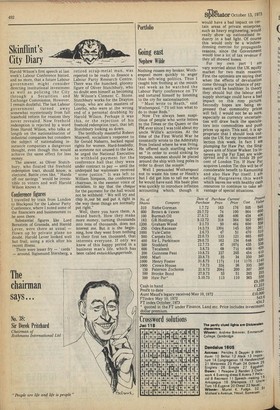Skinflint's City Diary
Harold Wilson's first speech at last week's Labour Conference hinted, and no more, that a future Labour government might consider directing institutional investment as well as policing the City through a Securities and Exchange Commission. However, 1 remain doubtful. The last Labour government turned away somewhat mysteriously from full leasehold reform for reasons they never revealed. Now freehold redemption is rejected by a word from Harold Wilson, who talks at length on the nationalisation of industrial companies but considers the subject of nationalising insurance companies a dangerous thought, even though this would achieve the same effect for less money.
The answer, as Oliver Stutchbury, who floated the freehold redemption tract, should know, is electoral. Battle cries like, " Hands off our savings" would be irresistible to voters and well Harold Wilson knows it.
Conference figures
1 travelled by train from London to Blackpool for the Labour Party Conference, where I noted some of the financiers and businessmen to be seen there.
Substantial figures like Lord Bernstein of Granada, and Harold Lever, were there as usual — flown up by private plane no doubt. Harold Lever looked well but frail, using a stick after his recent illness.
There were lesser fry — ' cards' — around. Sigismund Sternberg, a
retired scrap-metal man, was
reported to be ready to finance a Labour Party Research Centre.
There was the hunched, gloomy figure of Oliver Stutchbury, who no doubt sees himself as becoming Mr Wilson's Clement C. Stone. Stutchbury works for the Drayton Group, who are also masters of Lonrho, who were at the wrong end of a personal drubbing by Harold Wilson. Perhaps it was this, or the rejection of his freehold redemption tract, that left Stutchbury looking so down.
The terrifically masterful Robert Maxwell, socialism's response to Sir Gerald Nabarro, backed equal rights for women. Hard-headedly, as someone not unused to the law, he urged the National Executive to withhold payment for the conference hall that they were under contract to pay — until the underpaid bar waitresses received " some justice." It was left to William Simpson, the conference chairman, in the sweeter voice of socialism, to say that the cheque' for the payment for the hall would not be withheld: "We will try and chip in,our bit and put it right in the way these things are normally put right."
Well, there you have them. A mixed bunch. How they make more money, turning thousands into tens of thousands, does not interest me. But it is the begin ning, how they went from nothing to their first ten thousand, that
interests everyone. If only we knew of this happy period in a business man's life, which has been called entwicklungsperiode.


































 Previous page
Previous page